Unit 5 Do you want to watch a game show?讲练课件(共83张PPT)
文档属性
| 名称 | Unit 5 Do you want to watch a game show?讲练课件(共83张PPT) | 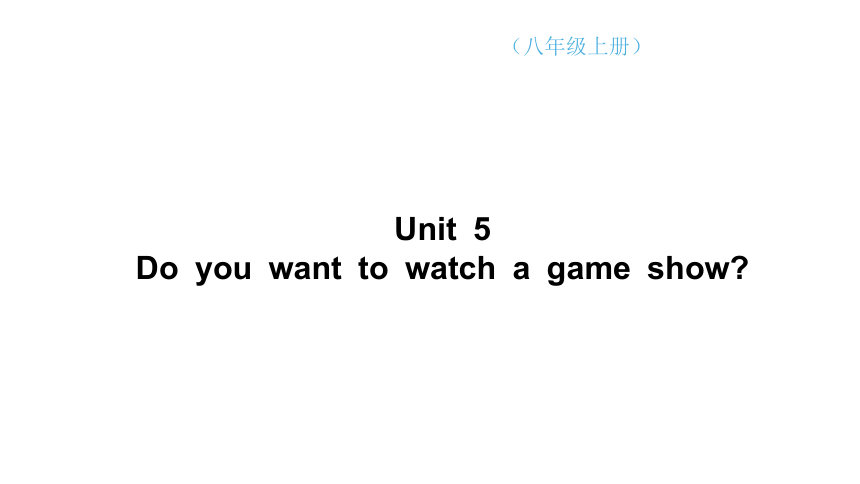 | |
| 格式 | pptx | ||
| 文件大小 | 418.5KB | ||
| 资源类型 | 教案 | ||
| 版本资源 | 人教新目标(Go for it)版 | ||
| 科目 | 英语 | ||
| 更新时间 | 2024-05-21 11:52:42 | ||
图片预览


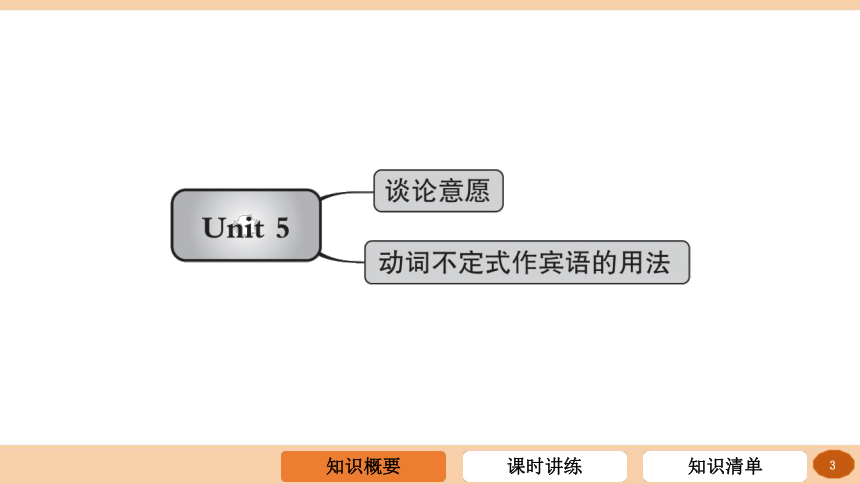

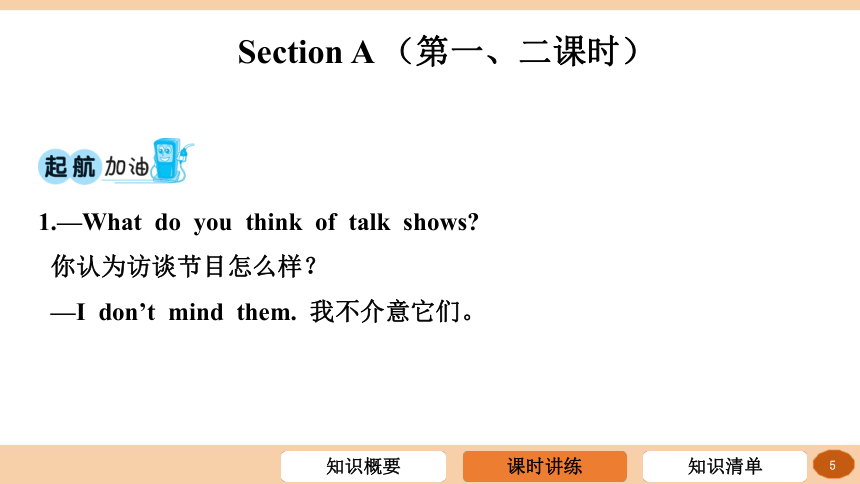
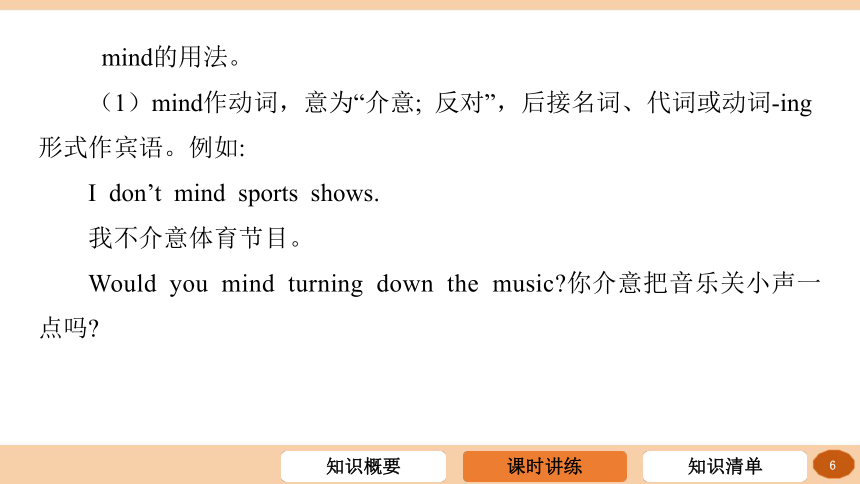
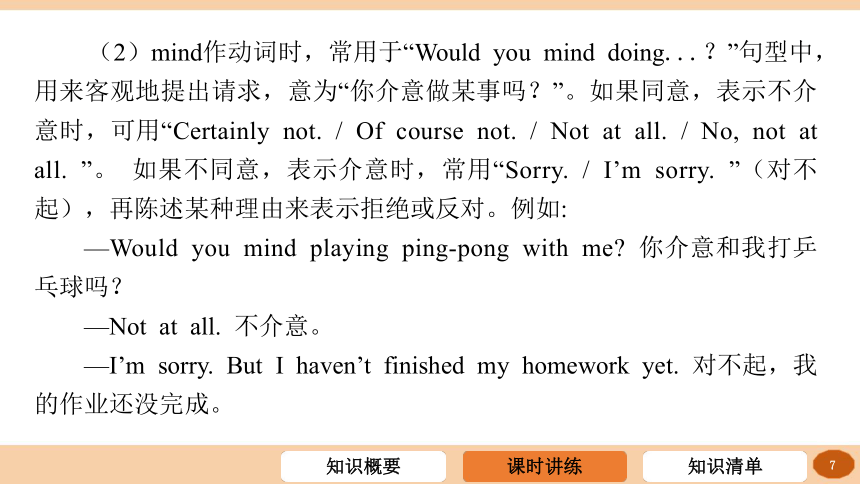
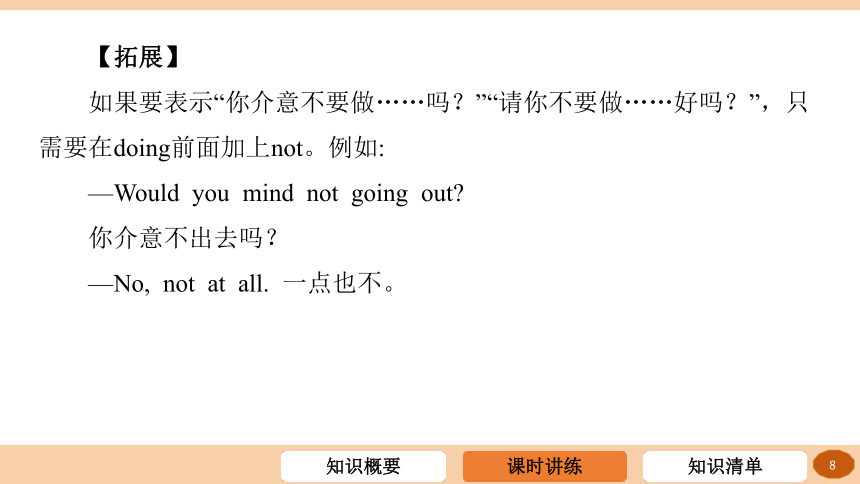
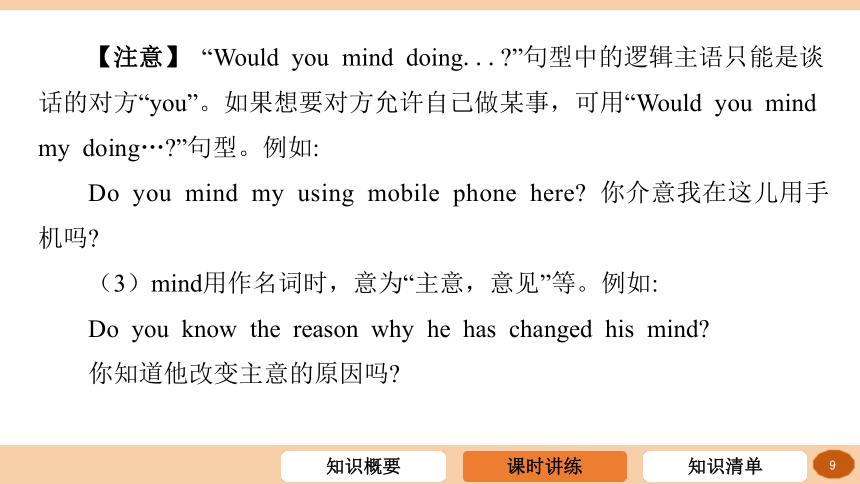

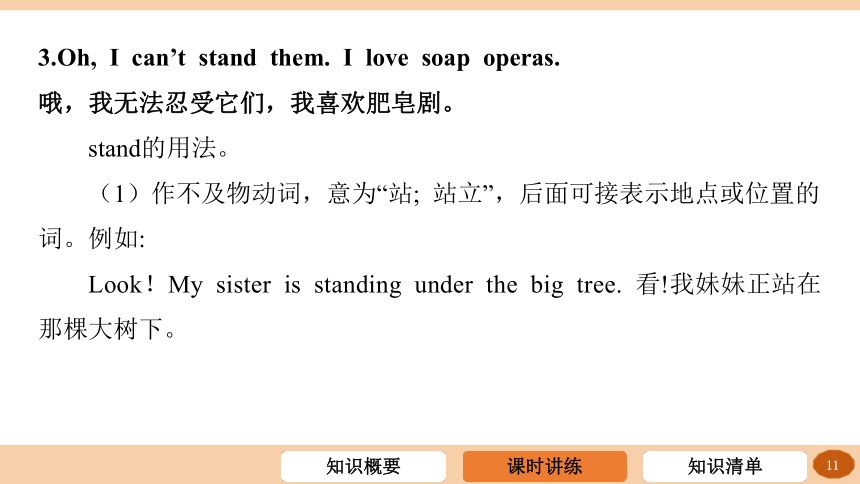
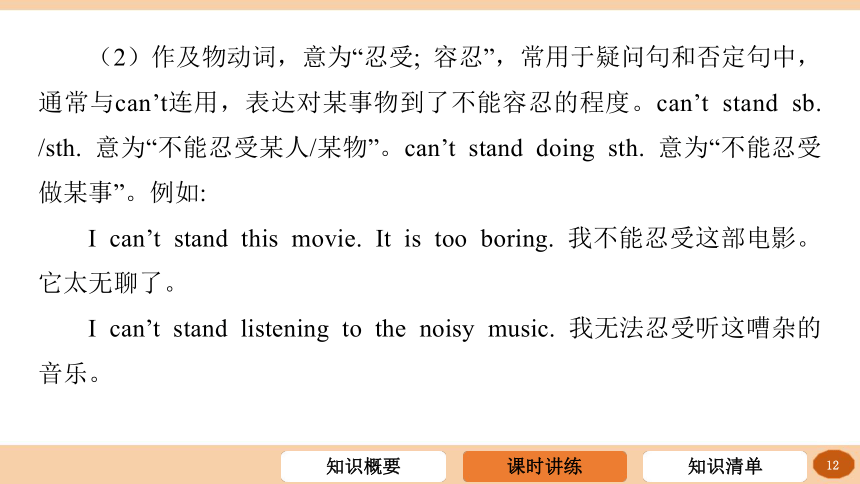
文档简介
(共83张PPT)
Unit 5
Do you want to watch a game show
知识概要
课时讲练
1.—What do you think of talk shows
你认为访谈节目怎么样?
—I don’t mind them. 我不介意它们。
Section A (第一、二课时)
mind的用法。
(1)mind作动词,意为“介意; 反对”,后接名词、代词或动词-ing形式作宾语。例如:
I don’t mind sports shows.
我不介意体育节目。
Would you mind turning down the music 你介意把音乐关小声一点吗
(2)mind作动词时,常用于“Would you mind doing...?”句型中,用来客观地提出请求,意为“你介意做某事吗?”。如果同意,表示不介意时,可用“Certainly not. / Of course not. / Not at all. / No, not at all. ”。 如果不同意,表示介意时,常用“Sorry. / I’m sorry. ”(对不起),再陈述某种理由来表示拒绝或反对。例如:
—Would you mind playing ping-pong with me 你介意和我打乒乓球吗?
—Not at all. 不介意。
—I’m sorry. But I haven’t finished my homework yet. 对不起,我的作业还没完成。
【拓展】
如果要表示“你介意不要做……吗?”“请你不要做……好吗?”,只需要在doing前面加上not。例如:
—Would you mind not going out
你介意不出去吗?
—No, not at all. 一点也不。
【注意】 “Would you mind doing... ”句型中的逻辑主语只能是谈话的对方“you”。如果想要对方允许自己做某事,可用“Would you mind my doing… ”句型。例如:
Do you mind my using mobile phone here 你介意我在这儿用手机吗
(3)mind用作名词时,意为“主意,意见”等。例如:
Do you know the reason why he has changed his mind
你知道他改变主意的原因吗
2.We had a discussion about TV shows.
我们讨论电视节目了。
have a discussion about意为“就……讨论”,其中discussion是discuss的名词形式。例如:
We had a hot discussion about our summer trip just now. 我们刚才热烈地讨论了我们的暑假旅行。
3.Oh, I can’t stand them. I love soap operas.
哦,我无法忍受它们,我喜欢肥皂剧。
stand的用法。
(1)作不及物动词,意为“站; 站立”,后面可接表示地点或位置的词。例如:
Look!My sister is standing under the big tree. 看!我妹妹正站在那棵大树下。
(2)作及物动词,意为“忍受; 容忍”,常用于疑问句和否定句中,通常与can’t连用,表达对某事物到了不能容忍的程度。can’t stand sb. /sth. 意为“不能忍受某人/某物”。can’t stand doing sth. 意为“不能忍受做某事”。例如:
I can’t stand this movie. It is too boring. 我不能忍受这部电影。它太无聊了。
I can’t stand listening to the noisy music. 我无法忍受听这嘈杂的音乐。
4.Do you plan to watch the news tonight
你今晚打算看新闻吗?
plan的用法。
(1)作动词,意为“计划; 打算”,过去式是planned,现在分词是planning。常用短语plan to do sth., 意为“计划做某事”。例如:
I plan to learn ten new words every night. 我计划每天晚上学十个新单词。
(2)plan作名词,意为“计划; 方案,打算”。 make a plan“制订计划”; a plan for“……的计划”。例如:
Nick is making a plan for the coming weekend. 尼克在为即将到来的周末做计划。
5.Because I hope to find out what’s going on around the world.
因为我希望弄清世界各地正在发生什么事情。
(1)hope的用法。
①hope既可作名词,也可作动词,意为“希望”。作动词时,其后可以接宾语从句,也可以接不定式,hope to do sth. 表示“希望做某事”。hope不能用于hope sb. to do sth. 结构中。如果想表示“希望某人做某事”,只能在hope后面使用宾语从句。例如:
I hope to visit the Palace Museum one day. = I hope I can visit the Palace Museum one day. 我希望有一天能参观故宫。
②hope与wish的用法区别。
单词 词性 释 义 常用结构
hope 动词 表示可以实现或能 达成的“希望”。 hope to do sth. 意为“希望做某事”
hope+ that从句
*不能接sb. to do sth. 和双宾语
wish 动词 “希望; 愿望”,常 指难以实现或不能 实现的愿望,从句 常用虚拟语气。 wish to do sth. 意为“希望做某事”
wish sb. to do sth. 意为“希望某人
做某事”
wish+ that从句
例如:
I hope to go to college. 我希望上大学。
I hope everything goes well for you.
我希望你一切顺利。
I wish that I could fly like a bird.
我希望我能像小鸟一样飞翔。(指难以实现的愿望, wish后从句的谓语动词用过去时或过去完成时。)
I wish you to join our volleyball team.
我希望你加入我们的排球队。(wish能接复合宾语,hope则不能。)
I wish you good luck. 我祝你好运。(wish能接双宾语表示祝愿,hope则不能。)
③hope可与so或not连用,分别代替一个具有肯定或否定意义的宾语从句,以免重复,wish则不能这样用。例如:
—Do you think it will snow
你认为将会下雪吗
—I hope so. 我希望是这样。
—I hope not. 我希望不会。
(2)find out, look for, find 的用法区别。
词语 释 义 用 法
find out 查明,弄清 指经过观察、调查把某事、某物或真相查出来。
look for 寻找 强调找的动作。
find 找到 强调找的结果。
例如:
Think it over, and you’ll find out the way to solve this problem. 仔细想想,你就会找到解决这个问题的办法。
I looked for it everywhere, but I didn’t find it. 我到处找它,但没有找到。
6.I like to follow the story and see what happens next.
我喜欢跟随故事看接下来发生什么。
(1)follow作动词,意为“跟随,遵循,仿效,听懂,听清”。例如:
Please follow me. 请跟我来。
She spoke too fast. I couldn’t follow her. 她说得太快了。我没听懂。
(2)happen是不及物动词,意为“发生; 出现”,其主语常为事,而不能是人。常见用法如下:
①“Sth. + happen (s)/happened +时间/地点”表示“某时某地发生了某事”。例如:
The moving story happened in 2020.
这个感人的故事发生在2020年。
②“Sth. + happen(s)/happened to +sb.” 表示“某人出了某事”(常指不好的事情)。例如:
A traffic accident happened to her.
一场交通事故发生在她身上。
③“Sb. + happen(s)/happened + to do sth.” 表示“某人碰巧做某事”。例如:
I happened to meet her in the supermarket yesterday.
昨天我碰巧在超市遇到她。
④ “It happens/happened+that从句.” 表示“碰巧/恰巧发生某事”。例如:
It happened that I was out when you called me. 你打电话给我时,我碰巧不在家。
【辨析】 happen, take place
词语 释 义 用 法
happen 发生; 碰巧 指偶然的、计划外的事情“发生”。强调
事情发生的偶然性。
take place 发生; 举 行,举办 指有计划或事先安排的事件、事情的
“发生”,没有偶然性。
例如:
The accident happened on a rainy night last November.
事故发生在去年十一月的一个雨夜。
The meeting will take place next Wednesday. 会议将在下周三举行。
7.Well, they may not be very exciting, but you can expect to learn a lot from them.
嗯,它们也许没那么刺激,但你可以期待学到很多东西。
expect是动词,意为“期待,期盼; 预料,估计”,常见用法如下。
(1)“expect +名词/代词”。例如:
I’m expecting a letter from Betty.
我正期待着贝蒂的来信。
(2)expect to do sth. 意为“期待/ 预计做某事”。例如:
George expects to come back next Sunday. 乔治预计下星期日回来。
My mum didn’t expect to receive such a lovely present from me!我妈妈没有想到会从我这里得到这么可爱的礼物!
(3)expect sb. to do sth. 意为“希望/期盼某人做某事”。例如:
She is expecting me to come tomorrow.
她期待我明天来。
(4)“expect + that从句”。例如:
We expect that Frank will win the first place in the singing competition. 我们期望弗兰克在歌唱比赛中得第一名。
基础达标
一、单项选择。
1.I can’t stand ________ the terrible TV play.( )
C
A.watch B.to watch C.watching
2.I don’t ________if she can change her________.( )
C
A.mind; minds B.minds; minds C.mind; mind
3.The boys are planning ________ a trip this summer vacation.( )
C
A.take B.taking C.to take
4.They are trying ________ what is going on around the world.( )
B
A.find out B.to find out C.look for
5.I hope ________to the beach with my parents this week.( )
A
A.to go B.that go C.you going
6.—What do you ________the story
—It is very interesting.( )
C
A.like of B.like C.think of
7.The boys went on ________ without a rest.( )
B
A.run B.running C.to run
8.It’s too noisy in the hall. We can’t ________ it. We all ________ up
and go out of the hall.( )
C
A.sit; seat B.stand; sit C.stand; stand
9.—What happened ________ you
—I happened ________ meet my old friend, Lucy.( )
A
A.to; to B.with; to C.to; with
10.—Would you mind if I play the violin here
—________My grandma is sleeping.( )
C
A.Yes, I would. B.Of course not. C.You’d better not.
二、根据汉语提示,写出正确的单词完成句子。
1.Mr. White is very funny. He often tells ______(笑话) to make
people laugh.
jokes
2.We had a __________(讨论) about the travel plan yesterday.
discussion
3.I want to know what’s __________(发生)over there.
happening
4.My sister likes to watch _________(喜剧)best.
comedies
5.I like the film,because it is ___________(有教育意义的).
educational
三、用括号内所给单词的适当形式填空。
1.I can’t stand _________(listen) to the noisy music.
listening
2.How exciting the news ___(be).
is
3.My sister expects me ________(teach)her to play chess.
to teach
4.Would you mind ________ (open) the door
opening
5.Jason hopes ______(be) a TV reporter one day.
to be
能力训练
四、从方框中选择恰当的选项,补全对话。有一项多余。
A: Hi, Tom!What are you doing
B: Hi, Peter! I’m watching TV.
A: 1. ( )
B: I like sports shows, such
as basketball, football and
volleyball games. What
about you
C
A. Do your parents like them
B. It’s really popular now.
C. What kind of shows do you like
D. I can’t stand them.
E. What do you think of it
F. Different people like different TV shows.
A: I like Animal World. I’m interested in animals and I want to know more about them. 2. ( )
E
B: I like it, but not very much.
A: What do you think of soap operas
B: 3. ( )
A: How about your parents
D
A. Do your parents like them
B. It’s really popular now.
C. What kind of shows do you like
D. I can’t stand them.
E. What do you think of it
F. Different people like different TV shows.
B: They like them very much. 4.( )
A: No, they like to watch TV shows.
B: 5.( )TV can bring us a lot of pleasure.
A: You are right.
A
F
A. Do your parents like them
B. It’s really popular now.
C. What kind of shows do you like
D. I can’t stand them.
E. What do you think of it
F. Different people like different TV shows.
Section B (第三、四课时)
1.影视节目类词语归纳
(1)电视节目分类。
talk show 脱口秀
soap opera 肥皂剧
sports show 体育节目
game show 游戏类节目
news 新闻
talent show 才艺秀
(2)电影分类。
comedy 喜剧片 cartoon 卡通片
action movie 动作片
scary movie 恐怖片
(3)谈论电影、电视节目的相关形容词。
educational 有教育意义的
serious 严肃的
wonderful 精彩的
relaxing 令人放松的
2.meaningless毫无意义的
meaningless是形容词,意为“毫无意义的; 意思不明确的”,为派生词,由“meaning(意思,意义; 价值)+后缀-less”构成。例如:
—How do you like this game show
你觉得这个游戏节目怎么样?
—I think it’s meaningless.
我认为它毫无意义。
【拓展】
①“名词+-less”构成形容词,后缀-less表示“无”之意。例如:
careless 粗心的 homeless 无家可归的
helpless 无助的 hopeless 没有希望的
②meaningful 是形容词,意为“有意义的,意义深长的”。
3.John wants to watch talk shows because they are enjoyable. 约翰喜欢看访谈节目,因为它们令人愉快。
enjoyable是形容词,意为“令人愉快的; 使人快乐的; 有乐趣的”,为派生词,由“enjoy(享受; 喜爱)+后缀-able”构成。例如:
We had an enjoyable time in the park last Saturday.
我们上周六在公园玩得很开心。
【拓展】
“动词+-able” 构成形容词,表示“能够,适于,值得”。例如:
countable可数的 valuable有价值的
comfortable舒适的 unforgettable难忘的
4.Over 90 years ago, he first appeared in the cartoon Steamboat Willie. 90多年前,他首次在卡通片《威利号汽船》中出现。
(1)over是介词,意为“超出; 比……多”,与more than同义。例如:
There are over forty students in the classroom. 教室有40多名学生。
(2)appear是动词,意为“出现; 露面”。 例如:
My sister didn’t appear until nine o’clock. 我妹妹直到九点才到。
The famous singer often appears on television. 这位知名歌手经常在电视上露面。
5.When this cartoon came out in New York on November 18, 1928... 当这部卡通片于1928年11月18日在纽约发行时……
come out意为“发行; 出版”。例如:
That magazine comes out every Saturday. 那本杂志每星期六出版。
【拓展】
come out还可以表示“出来,出现”。 例如:
The sun comes out and shines.
太阳出来了, 闪耀着光芒。
6.He became very rich and successful.
他变得既富有又成功。
successful 是形容词,意为“成功的,有成就的”。 例如:
Mr. Brown is a successful businessman.
布朗先生是个成功的商人。
【拓展】
①successfully 是副词,意为“成功地”。例如:
They finished the task successfully.
他们成功地完成了任务。
②success 作不可数名词,意为“成功”; 作可数名词,意为“成功的人/事”。 例如:
Failure is the mother of success.
失败是成功之母。
The party was a great success.
晚会开得非常成功。
③succeed是不及物动词,意为“成功”,常用于succeed in (doing) sth. 结构中,意为“成功做某事”。例如:
China succeeded in holding the 24th Olympic Winter Games.
中国成功举办了第24届冬季奥运会。
7.In the 1930s, he made 87 cartoons with Mickey. 在20世纪30年代,他制作了87部米老鼠卡通片。
in the 1930s意为“在20世纪30年代”,读作: in the nineteen thirties。
【注意】表达年代要用定冠词the。例如:
the 1860s/1860’s 意为“19世纪60年代”,读作: the eighteen sixties。
8.Some people might ask how this cartoon animal became so popular. 一些人可能会问这个卡通动物是怎样变得如此受欢迎的。
might为情态动词,意为“可能”,没有人称和数的变化,表示可能性很小,与动词原形一起构成谓语。例如:
I don’t know why she is late. She might have had an accident. 我不知道她为何迟到, 她可能遇上了事故。
It might be rainy tomorrow.
明天可能有雨。
9.However, he was always ready to try his best. 然而,他总乐于竭尽全力。
(1)ready是形容词,意为“愿意的; 准备好的”,常用于以下结构中。
①be ready to do sth. 意为“乐于做某事”。 例如:
Linda is ready to help other people.
琳达乐于帮助他人。
②be ready to do sth. 意为“准备好做某事”。例如:
We are ready to start at short notice.
我们已准备好,一接到通知就出发。
②be ready to do sth. 意为“准备好做某事”。例如:
We are ready to start at short notice.
我们已准备好,一接到通知就出发。
③be ready for sth. 意为“为……做好准备”。例如:
Are you ready for the coming festive season
你准备好迎接即将到来的节日季了吗?
(2)try one’s best意为“尽某人最大努力”,与do one’s best同义。例如:
We are trying our best to make our country more and more beautiful. 我们正尽最大努力使我们的国家变得越来越美丽。
10.Who has a pair of ears more famous than Mickey’s 谁会有一对比米老鼠更有名的耳朵呢
(1)a pair of “一双,一对,一副”,与名词连用作主语时,谓语动词用单数还是复数,取决于pair是单数还是复数。 例如:
There are two new pairs of gloves on the sofa. 沙发上有两副新手套。
This pair of trousers looks very nice.
这条裤子看起来非常好看。
(2)famous是形容词,意为“著名的; 出名的”。 同义词为
well-known, 反义词为unknown。
【辨析】be famous for,be famous as, be famous to
短 语 释 义 用 法
be famous for 因为…… 而出名 后接出名的原因,与be known
for同义。
be famous as 作为…… 而闻名 后接表示身份、职业的名词,与
be known as同义。
be famous to 为…… 所熟知 后接表示人的词。
例如:
Sanya is famous for its beautiful beaches. 三亚因为它美丽的沙滩而闻名。
She is famous as a great dancer.
她作为一个伟大的舞蹈家而出名。
This actor is famous to lots of young people. 这位演员为许多年轻人所熟知。
11.She dresses up like a boy and takes her father’s place to fight in the army.
她打扮成男孩模样替父从军打仗。
(1)dress up意为“装扮; 乔装打扮; 梳理”。例如:
Robert dressed up as Monkey King.
罗伯特装扮成美猴王的样子。
The girls have dressed up for the fancy dress ball. 姑娘们为化装舞会穿上盛装。
(2)take sb.’s place意为“代替”,与replace sb. 同义。例如:
I’ll take Jack’s place while he is out.
杰克外出时,我将代替他。
【拓展】
take the place of意为“代替”。 例如:
Nothing in the world can take the place of persistence.
世界上没有什么可以取代坚持。
基础达标
一、单项选择。
1.This country is famous ________ its beautiful lakes.( )
B
A.of B.for C.as
2.—When will your new book ________
—Probably in November.( )
C
A.come up B.come over C.come out
3.This pair of jeans ________ nice on Grace because she looks very
nice in blue.( )
B
A.look B.looks C.looked
4.We should ________ those helpful people. They are always ready to
help others.( )
A
A.learn from B.learn with C.learn to
5.Mary’s parents are ready ________ everything for her.( )
C
A.doing B.do C.to do
6.Harry always tries his best ________ out the problem.( )
C
A.working B.work C.to work
7.—Do you like to watch the game shows
—No, I don’t. I think they are ________.( )
C
A.lucky B.expensive C.meaningless
8.She is famous ________ her songs ________ a singer to people all
over the city.( )
A
A.for; as B.for; for C.as; for
小锦囊
be famous for后接原因; be famous as后接表示身份、职业的名词。
9.—Excuse me, is this the right way to Moon Cinema
—Sorry, I’m not sure. But it ________ be.( )
A
A.might B.must C.need
10.Mandy is very important in the team. No one can ________.( )
B
A.take hers place B.take her place C.takes her place
二、根据汉语提示,写出正确的单词完成句子。
1.Anna grows up and she doesn’t like watching ________(卡通片)
any more.
cartoons
2.The question is very _______(简单的), so all the students can
answer it.
simple
3.Susan said she would come to the party, but she didn’t _______(出
现).
appear
4.The Great Wall is the ________(标志) of China.
symbol
5.If you work hard, you will be __________(成功的).
successful
三、用括号内所给单词的适当形式填空。
1.Hurry up! You might _____(miss) the early bus.
miss
2.Susan was ________(lucky) yesterday. She broke her right arm.
unlucky
3.One of the main ________(reason) is that he is very brave.
reasons
4.Jerry likes watching _______(act) movies very much.
action
5.I don’t like soap operas because they are ____________(meaning).
meaningless
能力训练
四、从方框中选择适当的单词,并用其正确形式填空。
with find main leave get bored describe sleep however nothing
Roman Holiday is an old American movie. The 1. . actress
in the movie is Hepburn. She is a princess named Ann. In Rome, she
feels very sad because of her 2. . life. Her doctor gives her
some medicine to help her sleep. 3. ., she tries to leave her
room to feel the real Rome.
main
boring
However
After 4. . her room, she is very tired. She can do anything
she likes. But quickly she goes to 5. . on a bench (长凳)
because of the medicine she takes.
On Joe’s way back home, he finds her. He wants to send her
home, but she says 6. . about where she lives. Then Joe takes
her to his home. Next day, Joe 7. . that the girl is the princess
from a piece of newspaper. He plans to 8. . some money from her.
But after spending a day 9. . her, he changes (改变) his mind.
The movie mainly 10. . Ann’s life in Rome with Joe. It’s
very interesting.
leaving
sleep
nothing
finds
get
with
describes
with find main leave get bored describe sleep however nothing
Self Check (第五课时)
本单元我们学习了关于“谈论喜欢的影视作品”的话题,重点学习了如何询问别人的观点和如何表达对某人或某物的看法。因此,要求同学们能根据所学,谈论某部电影或某个电视节目,表达出自己的观点和看法。注意在对某部电影进行描述时,可以从四个方面来展开:
1.the name of the movie
2.the kind of movie
3.what the movie is about
4.what you think of the movie/actors
可用于这类话题作文的重点句型有:
1.I don’t like/don’t mind/can’t stand it.
我不喜欢/不介意/不能忍受它。
2.I like to watch...because...exciting/wonderful...
我喜欢看……因为……很刺激/精彩……
3.It is an exciting action movie.
它是一部令人激动的动作片。
4.The movie is about ...
这部影片是关于……
5.I think the actress played Mulan’s role well. 我认为这个女演员演木兰的角色演得非常好。
6.The other actors are also fantastic and they did a good job in the movie. 其他的演员也都很好,而且演得也很棒。
素养提升
一、从方框中选出恰当的选项,补全对话。有一项多余。
A: Hi, Julia! Can you go out this Sunday night
B: Yes, I can. 1.( )
A: I want to go to a movie. Let’s go together.
B: Sounds great. 2.( )
A: I like action movies.
B: Oh. 3.( )
E
C
A
A. Why do you like action movies
B. They are my favorites.
C. What kind of movies do you like
D. I think they are boring.
E. What do you want to do
F. Then let’s see a cartoon movie.
A: Because I think they’re exciting.
B: Exciting 4. ( ) I like cartoon movies.
A: 5.( )There is a new cartoon movie on.
B: Great. See you this Sunday.
A: See you.
A. Why do you like action movies
B. They are my favorites.
C. What kind of movies do you like
D. I think they are boring.
E. What do you want to do
F. Then let’s see a cartoon movie.
D
F
二、从方框中选择恰当的单词,并用其正确形式填空。
do three it good but popular for keep begin health
Yoga(瑜伽) is a kind of sport. It is very 1. . all over
the world now. Everyone can do yoga. It is good 2. . both men
and women. Why do more and more people 3. . yoga It’s hard to
say. The short answer is that yoga helps you to 4. . fit. For many
people,this answer is enough.5. . there is more if you have an
interest in it. Yoga 6. . in India about 5,000 years ago. At that
popular
for
do
keep
But
began
time, people wanted to be free,7. . and live a long life. So this
kind of exercise appeared. Yoga is a Sanskrit(梵语) word and 8. .
means“to join together”.
There are 9. . parts in yoga:exercise,breathing and thinking. If
you do 10. . in yoga, it can give you peace(平静) and help
you feel less stressed.
healthy
it
three
well
do three it good but popular for keep begin health
三、阅读理解。
I like watching TV very much for I think it has many advantages.
First of all, watching TV is a good rest. After a day of hard work, we need a good rest. Watching TV can make our mind and body not tired any more because of the pleasant music and TV plays.
Besides, watching TV is entertaining(娱乐消遣). There are many kinds of entertainment, such as sports activities, singing and dancing concerts, plays and films all over the world at every time. It’s
not possible for us to go to every place to enjoy all the activities within a short time. We need at least over ten hours to fly from New York to Paris, a week by train from Beijing to Moscow and an hour to drive from Queens District to Manhattan District. But within just one second, TV can bring us from an NBA game in New York to a fashion show in Paris by changing the channels.
Most importantly, watching TV is educational. Our children can learn every kind of subject through the educational programmes and the special reports on TV, and it’s easy for them to learn Chinese from a
Chinese teacher in Beijing and to learn Russian lessons from a Russian teacher in Moscow. Even we can learn how to behave well from the TV plays. Meanwhile, a teacher can teach millions of students without a huge classroom.
But everything has two sides. Spending too much time on TV is not a good thing. And some TV programs are not so good. We must learn to choose.
根据短文内容,选择正确答案。
( ) 1.What does the underlined word “advantages” mean in Chinese
C
A.不利因素 B.便宜 C.优点
( ) 2.What does the writer want to tell us in the third paragraph
C
A.How long it will take a man to drive to different places.
B.TV stations send programmes quickly.
C.TV brings different parts of the world in front of us.
( ) 3.Which of the following is TRUE according to the passage
B
A.It’s not easy to drive from Manhattan to Queens District.
B.There are many kinds of entertainment programmes on TV.
C.The writer likes watching TV more than others.
( ) 4.What is the most important reason for watching TV according to the
writer
A
A.We can learn something useful.
B.We can see whatever we like.
C.We can enjoy ourselves.
( ) 5.What might be the best title for the passage
C
A.TV brings good rest
B.How to use TV in schools
C.The advantages of watching TV
四、书面表达。
请根据表格内容写一篇英语短文,谈谈你的家庭成员喜欢与不喜欢的电视节目,并说明理由。70词左右。
family member likes reasons dislikes reasons
I talent shows, game shows interesting, exciting sports shows boring
mother sitcoms, soap operas relaxing, funny sports shows boring
father news useful soap operas boring
______________________________________________________________
__________________________________________________________________________________________________________________________________________________________________________________________________________________________________________________________________________________________________________________________________________________________________________________________________________________________________________________
There are three people in my family. I like watching talent shows and game shows, because I think they are very interesting and exciting. My mother likes sitcoms and soap operas. She thinks they are very relaxing and funny. As for my father, he likes watching the news every day. He thinks it’s useful for him to know what’s happening around the world. My mother and I can’t stand sports shows because they’re boring. My father can’t stand soap operas because he thinks they’re boring.
One possible version:
知识清单
Unit 5
重点短语
1.__________考虑;有……想法;想起
think of
2.____________从……学到; 向……学习
learn from
3.______________计划做某事
plan to do sth.
4._______________希望做某事
hope to do sth.
5.__________找到;发现
find out
6._____________________对……进行讨论
have a discussion about
7.________________期望做某事
expect to do sth.
8._____________恐怖影片
scary movies
9.______________动作影片
action movies
10.__________出版,发行
come out
11.___________比如;例如
such as
12.________________________________
the first cartoon with sound and music
13.______________________
be ready to do something
准备做某事;愿意做某事
第一部有声配乐卡通片
14._____________尽某人最大努力
try one’s best
15.____________一双;一对
a pair of
16.______________……的象征; ……的标志
a symbol of
17.____________装扮;乔装打扮
dress up
18.________________代替;替换
take sb.’s place
19.________________工作干得好;做得好
do a good job
重点句型
1.___________________________________你今晚打算看新闻吗?
—Do you plan to watch the news tonight
_______________________是的,我打算看。/不,我不打算看。
—Yes, I do. /No, I don’t.
2.________________________________你今晚打算看什么?
—What do you plan to watch tonight
_______________________________我打算看《我们过去的日子》。
—I plan to watch Days of Our Past.
3.______________________________________你期待能从情景喜剧中学到什么?
—What can you expect to learn from sitcoms
____________________________我能学到一些经典笑话。
—I can learn some great jokes.
4.________________________________你为什么喜欢看新闻?
—Why do you like watching the news
____________________________________________________
—Because I hope to find out what’s going on around the world.
因为我想知道世界各地都发生了什么事。
5.______________________________你觉得脱口秀节目怎么样?
—What do you think of talk shows
_____________________________________________________
—I don’t mind them. /I can’t stand them! / I love watching them!
6.______________________________________然而,他总是准备尽最大努力。
However, he was always ready to try his best.
7.__________________________________________________
I’d like to find out what different people think about a subject.
8.______________________________
我希望有一天成为一名电视台记者。
I hope to be a TV reporter one day.
我不介意它们。/我受不了它们!/我非常喜欢看它们!
我想了解不同的人对同一主题的看法。
语法要点
1.动词不定式作宾语的用法。
2.掌握短语think of, find out, be ready to, take one’s place的用法。
3.会表达意愿并制订计划。
Unit 5
Do you want to watch a game show
知识概要
课时讲练
1.—What do you think of talk shows
你认为访谈节目怎么样?
—I don’t mind them. 我不介意它们。
Section A (第一、二课时)
mind的用法。
(1)mind作动词,意为“介意; 反对”,后接名词、代词或动词-ing形式作宾语。例如:
I don’t mind sports shows.
我不介意体育节目。
Would you mind turning down the music 你介意把音乐关小声一点吗
(2)mind作动词时,常用于“Would you mind doing...?”句型中,用来客观地提出请求,意为“你介意做某事吗?”。如果同意,表示不介意时,可用“Certainly not. / Of course not. / Not at all. / No, not at all. ”。 如果不同意,表示介意时,常用“Sorry. / I’m sorry. ”(对不起),再陈述某种理由来表示拒绝或反对。例如:
—Would you mind playing ping-pong with me 你介意和我打乒乓球吗?
—Not at all. 不介意。
—I’m sorry. But I haven’t finished my homework yet. 对不起,我的作业还没完成。
【拓展】
如果要表示“你介意不要做……吗?”“请你不要做……好吗?”,只需要在doing前面加上not。例如:
—Would you mind not going out
你介意不出去吗?
—No, not at all. 一点也不。
【注意】 “Would you mind doing... ”句型中的逻辑主语只能是谈话的对方“you”。如果想要对方允许自己做某事,可用“Would you mind my doing… ”句型。例如:
Do you mind my using mobile phone here 你介意我在这儿用手机吗
(3)mind用作名词时,意为“主意,意见”等。例如:
Do you know the reason why he has changed his mind
你知道他改变主意的原因吗
2.We had a discussion about TV shows.
我们讨论电视节目了。
have a discussion about意为“就……讨论”,其中discussion是discuss的名词形式。例如:
We had a hot discussion about our summer trip just now. 我们刚才热烈地讨论了我们的暑假旅行。
3.Oh, I can’t stand them. I love soap operas.
哦,我无法忍受它们,我喜欢肥皂剧。
stand的用法。
(1)作不及物动词,意为“站; 站立”,后面可接表示地点或位置的词。例如:
Look!My sister is standing under the big tree. 看!我妹妹正站在那棵大树下。
(2)作及物动词,意为“忍受; 容忍”,常用于疑问句和否定句中,通常与can’t连用,表达对某事物到了不能容忍的程度。can’t stand sb. /sth. 意为“不能忍受某人/某物”。can’t stand doing sth. 意为“不能忍受做某事”。例如:
I can’t stand this movie. It is too boring. 我不能忍受这部电影。它太无聊了。
I can’t stand listening to the noisy music. 我无法忍受听这嘈杂的音乐。
4.Do you plan to watch the news tonight
你今晚打算看新闻吗?
plan的用法。
(1)作动词,意为“计划; 打算”,过去式是planned,现在分词是planning。常用短语plan to do sth., 意为“计划做某事”。例如:
I plan to learn ten new words every night. 我计划每天晚上学十个新单词。
(2)plan作名词,意为“计划; 方案,打算”。 make a plan“制订计划”; a plan for“……的计划”。例如:
Nick is making a plan for the coming weekend. 尼克在为即将到来的周末做计划。
5.Because I hope to find out what’s going on around the world.
因为我希望弄清世界各地正在发生什么事情。
(1)hope的用法。
①hope既可作名词,也可作动词,意为“希望”。作动词时,其后可以接宾语从句,也可以接不定式,hope to do sth. 表示“希望做某事”。hope不能用于hope sb. to do sth. 结构中。如果想表示“希望某人做某事”,只能在hope后面使用宾语从句。例如:
I hope to visit the Palace Museum one day. = I hope I can visit the Palace Museum one day. 我希望有一天能参观故宫。
②hope与wish的用法区别。
单词 词性 释 义 常用结构
hope 动词 表示可以实现或能 达成的“希望”。 hope to do sth. 意为“希望做某事”
hope+ that从句
*不能接sb. to do sth. 和双宾语
wish 动词 “希望; 愿望”,常 指难以实现或不能 实现的愿望,从句 常用虚拟语气。 wish to do sth. 意为“希望做某事”
wish sb. to do sth. 意为“希望某人
做某事”
wish+ that从句
例如:
I hope to go to college. 我希望上大学。
I hope everything goes well for you.
我希望你一切顺利。
I wish that I could fly like a bird.
我希望我能像小鸟一样飞翔。(指难以实现的愿望, wish后从句的谓语动词用过去时或过去完成时。)
I wish you to join our volleyball team.
我希望你加入我们的排球队。(wish能接复合宾语,hope则不能。)
I wish you good luck. 我祝你好运。(wish能接双宾语表示祝愿,hope则不能。)
③hope可与so或not连用,分别代替一个具有肯定或否定意义的宾语从句,以免重复,wish则不能这样用。例如:
—Do you think it will snow
你认为将会下雪吗
—I hope so. 我希望是这样。
—I hope not. 我希望不会。
(2)find out, look for, find 的用法区别。
词语 释 义 用 法
find out 查明,弄清 指经过观察、调查把某事、某物或真相查出来。
look for 寻找 强调找的动作。
find 找到 强调找的结果。
例如:
Think it over, and you’ll find out the way to solve this problem. 仔细想想,你就会找到解决这个问题的办法。
I looked for it everywhere, but I didn’t find it. 我到处找它,但没有找到。
6.I like to follow the story and see what happens next.
我喜欢跟随故事看接下来发生什么。
(1)follow作动词,意为“跟随,遵循,仿效,听懂,听清”。例如:
Please follow me. 请跟我来。
She spoke too fast. I couldn’t follow her. 她说得太快了。我没听懂。
(2)happen是不及物动词,意为“发生; 出现”,其主语常为事,而不能是人。常见用法如下:
①“Sth. + happen (s)/happened +时间/地点”表示“某时某地发生了某事”。例如:
The moving story happened in 2020.
这个感人的故事发生在2020年。
②“Sth. + happen(s)/happened to +sb.” 表示“某人出了某事”(常指不好的事情)。例如:
A traffic accident happened to her.
一场交通事故发生在她身上。
③“Sb. + happen(s)/happened + to do sth.” 表示“某人碰巧做某事”。例如:
I happened to meet her in the supermarket yesterday.
昨天我碰巧在超市遇到她。
④ “It happens/happened+that从句.” 表示“碰巧/恰巧发生某事”。例如:
It happened that I was out when you called me. 你打电话给我时,我碰巧不在家。
【辨析】 happen, take place
词语 释 义 用 法
happen 发生; 碰巧 指偶然的、计划外的事情“发生”。强调
事情发生的偶然性。
take place 发生; 举 行,举办 指有计划或事先安排的事件、事情的
“发生”,没有偶然性。
例如:
The accident happened on a rainy night last November.
事故发生在去年十一月的一个雨夜。
The meeting will take place next Wednesday. 会议将在下周三举行。
7.Well, they may not be very exciting, but you can expect to learn a lot from them.
嗯,它们也许没那么刺激,但你可以期待学到很多东西。
expect是动词,意为“期待,期盼; 预料,估计”,常见用法如下。
(1)“expect +名词/代词”。例如:
I’m expecting a letter from Betty.
我正期待着贝蒂的来信。
(2)expect to do sth. 意为“期待/ 预计做某事”。例如:
George expects to come back next Sunday. 乔治预计下星期日回来。
My mum didn’t expect to receive such a lovely present from me!我妈妈没有想到会从我这里得到这么可爱的礼物!
(3)expect sb. to do sth. 意为“希望/期盼某人做某事”。例如:
She is expecting me to come tomorrow.
她期待我明天来。
(4)“expect + that从句”。例如:
We expect that Frank will win the first place in the singing competition. 我们期望弗兰克在歌唱比赛中得第一名。
基础达标
一、单项选择。
1.I can’t stand ________ the terrible TV play.( )
C
A.watch B.to watch C.watching
2.I don’t ________if she can change her________.( )
C
A.mind; minds B.minds; minds C.mind; mind
3.The boys are planning ________ a trip this summer vacation.( )
C
A.take B.taking C.to take
4.They are trying ________ what is going on around the world.( )
B
A.find out B.to find out C.look for
5.I hope ________to the beach with my parents this week.( )
A
A.to go B.that go C.you going
6.—What do you ________the story
—It is very interesting.( )
C
A.like of B.like C.think of
7.The boys went on ________ without a rest.( )
B
A.run B.running C.to run
8.It’s too noisy in the hall. We can’t ________ it. We all ________ up
and go out of the hall.( )
C
A.sit; seat B.stand; sit C.stand; stand
9.—What happened ________ you
—I happened ________ meet my old friend, Lucy.( )
A
A.to; to B.with; to C.to; with
10.—Would you mind if I play the violin here
—________My grandma is sleeping.( )
C
A.Yes, I would. B.Of course not. C.You’d better not.
二、根据汉语提示,写出正确的单词完成句子。
1.Mr. White is very funny. He often tells ______(笑话) to make
people laugh.
jokes
2.We had a __________(讨论) about the travel plan yesterday.
discussion
3.I want to know what’s __________(发生)over there.
happening
4.My sister likes to watch _________(喜剧)best.
comedies
5.I like the film,because it is ___________(有教育意义的).
educational
三、用括号内所给单词的适当形式填空。
1.I can’t stand _________(listen) to the noisy music.
listening
2.How exciting the news ___(be).
is
3.My sister expects me ________(teach)her to play chess.
to teach
4.Would you mind ________ (open) the door
opening
5.Jason hopes ______(be) a TV reporter one day.
to be
能力训练
四、从方框中选择恰当的选项,补全对话。有一项多余。
A: Hi, Tom!What are you doing
B: Hi, Peter! I’m watching TV.
A: 1. ( )
B: I like sports shows, such
as basketball, football and
volleyball games. What
about you
C
A. Do your parents like them
B. It’s really popular now.
C. What kind of shows do you like
D. I can’t stand them.
E. What do you think of it
F. Different people like different TV shows.
A: I like Animal World. I’m interested in animals and I want to know more about them. 2. ( )
E
B: I like it, but not very much.
A: What do you think of soap operas
B: 3. ( )
A: How about your parents
D
A. Do your parents like them
B. It’s really popular now.
C. What kind of shows do you like
D. I can’t stand them.
E. What do you think of it
F. Different people like different TV shows.
B: They like them very much. 4.( )
A: No, they like to watch TV shows.
B: 5.( )TV can bring us a lot of pleasure.
A: You are right.
A
F
A. Do your parents like them
B. It’s really popular now.
C. What kind of shows do you like
D. I can’t stand them.
E. What do you think of it
F. Different people like different TV shows.
Section B (第三、四课时)
1.影视节目类词语归纳
(1)电视节目分类。
talk show 脱口秀
soap opera 肥皂剧
sports show 体育节目
game show 游戏类节目
news 新闻
talent show 才艺秀
(2)电影分类。
comedy 喜剧片 cartoon 卡通片
action movie 动作片
scary movie 恐怖片
(3)谈论电影、电视节目的相关形容词。
educational 有教育意义的
serious 严肃的
wonderful 精彩的
relaxing 令人放松的
2.meaningless毫无意义的
meaningless是形容词,意为“毫无意义的; 意思不明确的”,为派生词,由“meaning(意思,意义; 价值)+后缀-less”构成。例如:
—How do you like this game show
你觉得这个游戏节目怎么样?
—I think it’s meaningless.
我认为它毫无意义。
【拓展】
①“名词+-less”构成形容词,后缀-less表示“无”之意。例如:
careless 粗心的 homeless 无家可归的
helpless 无助的 hopeless 没有希望的
②meaningful 是形容词,意为“有意义的,意义深长的”。
3.John wants to watch talk shows because they are enjoyable. 约翰喜欢看访谈节目,因为它们令人愉快。
enjoyable是形容词,意为“令人愉快的; 使人快乐的; 有乐趣的”,为派生词,由“enjoy(享受; 喜爱)+后缀-able”构成。例如:
We had an enjoyable time in the park last Saturday.
我们上周六在公园玩得很开心。
【拓展】
“动词+-able” 构成形容词,表示“能够,适于,值得”。例如:
countable可数的 valuable有价值的
comfortable舒适的 unforgettable难忘的
4.Over 90 years ago, he first appeared in the cartoon Steamboat Willie. 90多年前,他首次在卡通片《威利号汽船》中出现。
(1)over是介词,意为“超出; 比……多”,与more than同义。例如:
There are over forty students in the classroom. 教室有40多名学生。
(2)appear是动词,意为“出现; 露面”。 例如:
My sister didn’t appear until nine o’clock. 我妹妹直到九点才到。
The famous singer often appears on television. 这位知名歌手经常在电视上露面。
5.When this cartoon came out in New York on November 18, 1928... 当这部卡通片于1928年11月18日在纽约发行时……
come out意为“发行; 出版”。例如:
That magazine comes out every Saturday. 那本杂志每星期六出版。
【拓展】
come out还可以表示“出来,出现”。 例如:
The sun comes out and shines.
太阳出来了, 闪耀着光芒。
6.He became very rich and successful.
他变得既富有又成功。
successful 是形容词,意为“成功的,有成就的”。 例如:
Mr. Brown is a successful businessman.
布朗先生是个成功的商人。
【拓展】
①successfully 是副词,意为“成功地”。例如:
They finished the task successfully.
他们成功地完成了任务。
②success 作不可数名词,意为“成功”; 作可数名词,意为“成功的人/事”。 例如:
Failure is the mother of success.
失败是成功之母。
The party was a great success.
晚会开得非常成功。
③succeed是不及物动词,意为“成功”,常用于succeed in (doing) sth. 结构中,意为“成功做某事”。例如:
China succeeded in holding the 24th Olympic Winter Games.
中国成功举办了第24届冬季奥运会。
7.In the 1930s, he made 87 cartoons with Mickey. 在20世纪30年代,他制作了87部米老鼠卡通片。
in the 1930s意为“在20世纪30年代”,读作: in the nineteen thirties。
【注意】表达年代要用定冠词the。例如:
the 1860s/1860’s 意为“19世纪60年代”,读作: the eighteen sixties。
8.Some people might ask how this cartoon animal became so popular. 一些人可能会问这个卡通动物是怎样变得如此受欢迎的。
might为情态动词,意为“可能”,没有人称和数的变化,表示可能性很小,与动词原形一起构成谓语。例如:
I don’t know why she is late. She might have had an accident. 我不知道她为何迟到, 她可能遇上了事故。
It might be rainy tomorrow.
明天可能有雨。
9.However, he was always ready to try his best. 然而,他总乐于竭尽全力。
(1)ready是形容词,意为“愿意的; 准备好的”,常用于以下结构中。
①be ready to do sth. 意为“乐于做某事”。 例如:
Linda is ready to help other people.
琳达乐于帮助他人。
②be ready to do sth. 意为“准备好做某事”。例如:
We are ready to start at short notice.
我们已准备好,一接到通知就出发。
②be ready to do sth. 意为“准备好做某事”。例如:
We are ready to start at short notice.
我们已准备好,一接到通知就出发。
③be ready for sth. 意为“为……做好准备”。例如:
Are you ready for the coming festive season
你准备好迎接即将到来的节日季了吗?
(2)try one’s best意为“尽某人最大努力”,与do one’s best同义。例如:
We are trying our best to make our country more and more beautiful. 我们正尽最大努力使我们的国家变得越来越美丽。
10.Who has a pair of ears more famous than Mickey’s 谁会有一对比米老鼠更有名的耳朵呢
(1)a pair of “一双,一对,一副”,与名词连用作主语时,谓语动词用单数还是复数,取决于pair是单数还是复数。 例如:
There are two new pairs of gloves on the sofa. 沙发上有两副新手套。
This pair of trousers looks very nice.
这条裤子看起来非常好看。
(2)famous是形容词,意为“著名的; 出名的”。 同义词为
well-known, 反义词为unknown。
【辨析】be famous for,be famous as, be famous to
短 语 释 义 用 法
be famous for 因为…… 而出名 后接出名的原因,与be known
for同义。
be famous as 作为…… 而闻名 后接表示身份、职业的名词,与
be known as同义。
be famous to 为…… 所熟知 后接表示人的词。
例如:
Sanya is famous for its beautiful beaches. 三亚因为它美丽的沙滩而闻名。
She is famous as a great dancer.
她作为一个伟大的舞蹈家而出名。
This actor is famous to lots of young people. 这位演员为许多年轻人所熟知。
11.She dresses up like a boy and takes her father’s place to fight in the army.
她打扮成男孩模样替父从军打仗。
(1)dress up意为“装扮; 乔装打扮; 梳理”。例如:
Robert dressed up as Monkey King.
罗伯特装扮成美猴王的样子。
The girls have dressed up for the fancy dress ball. 姑娘们为化装舞会穿上盛装。
(2)take sb.’s place意为“代替”,与replace sb. 同义。例如:
I’ll take Jack’s place while he is out.
杰克外出时,我将代替他。
【拓展】
take the place of意为“代替”。 例如:
Nothing in the world can take the place of persistence.
世界上没有什么可以取代坚持。
基础达标
一、单项选择。
1.This country is famous ________ its beautiful lakes.( )
B
A.of B.for C.as
2.—When will your new book ________
—Probably in November.( )
C
A.come up B.come over C.come out
3.This pair of jeans ________ nice on Grace because she looks very
nice in blue.( )
B
A.look B.looks C.looked
4.We should ________ those helpful people. They are always ready to
help others.( )
A
A.learn from B.learn with C.learn to
5.Mary’s parents are ready ________ everything for her.( )
C
A.doing B.do C.to do
6.Harry always tries his best ________ out the problem.( )
C
A.working B.work C.to work
7.—Do you like to watch the game shows
—No, I don’t. I think they are ________.( )
C
A.lucky B.expensive C.meaningless
8.She is famous ________ her songs ________ a singer to people all
over the city.( )
A
A.for; as B.for; for C.as; for
小锦囊
be famous for后接原因; be famous as后接表示身份、职业的名词。
9.—Excuse me, is this the right way to Moon Cinema
—Sorry, I’m not sure. But it ________ be.( )
A
A.might B.must C.need
10.Mandy is very important in the team. No one can ________.( )
B
A.take hers place B.take her place C.takes her place
二、根据汉语提示,写出正确的单词完成句子。
1.Anna grows up and she doesn’t like watching ________(卡通片)
any more.
cartoons
2.The question is very _______(简单的), so all the students can
answer it.
simple
3.Susan said she would come to the party, but she didn’t _______(出
现).
appear
4.The Great Wall is the ________(标志) of China.
symbol
5.If you work hard, you will be __________(成功的).
successful
三、用括号内所给单词的适当形式填空。
1.Hurry up! You might _____(miss) the early bus.
miss
2.Susan was ________(lucky) yesterday. She broke her right arm.
unlucky
3.One of the main ________(reason) is that he is very brave.
reasons
4.Jerry likes watching _______(act) movies very much.
action
5.I don’t like soap operas because they are ____________(meaning).
meaningless
能力训练
四、从方框中选择适当的单词,并用其正确形式填空。
with find main leave get bored describe sleep however nothing
Roman Holiday is an old American movie. The 1. . actress
in the movie is Hepburn. She is a princess named Ann. In Rome, she
feels very sad because of her 2. . life. Her doctor gives her
some medicine to help her sleep. 3. ., she tries to leave her
room to feel the real Rome.
main
boring
However
After 4. . her room, she is very tired. She can do anything
she likes. But quickly she goes to 5. . on a bench (长凳)
because of the medicine she takes.
On Joe’s way back home, he finds her. He wants to send her
home, but she says 6. . about where she lives. Then Joe takes
her to his home. Next day, Joe 7. . that the girl is the princess
from a piece of newspaper. He plans to 8. . some money from her.
But after spending a day 9. . her, he changes (改变) his mind.
The movie mainly 10. . Ann’s life in Rome with Joe. It’s
very interesting.
leaving
sleep
nothing
finds
get
with
describes
with find main leave get bored describe sleep however nothing
Self Check (第五课时)
本单元我们学习了关于“谈论喜欢的影视作品”的话题,重点学习了如何询问别人的观点和如何表达对某人或某物的看法。因此,要求同学们能根据所学,谈论某部电影或某个电视节目,表达出自己的观点和看法。注意在对某部电影进行描述时,可以从四个方面来展开:
1.the name of the movie
2.the kind of movie
3.what the movie is about
4.what you think of the movie/actors
可用于这类话题作文的重点句型有:
1.I don’t like/don’t mind/can’t stand it.
我不喜欢/不介意/不能忍受它。
2.I like to watch...because...exciting/wonderful...
我喜欢看……因为……很刺激/精彩……
3.It is an exciting action movie.
它是一部令人激动的动作片。
4.The movie is about ...
这部影片是关于……
5.I think the actress played Mulan’s role well. 我认为这个女演员演木兰的角色演得非常好。
6.The other actors are also fantastic and they did a good job in the movie. 其他的演员也都很好,而且演得也很棒。
素养提升
一、从方框中选出恰当的选项,补全对话。有一项多余。
A: Hi, Julia! Can you go out this Sunday night
B: Yes, I can. 1.( )
A: I want to go to a movie. Let’s go together.
B: Sounds great. 2.( )
A: I like action movies.
B: Oh. 3.( )
E
C
A
A. Why do you like action movies
B. They are my favorites.
C. What kind of movies do you like
D. I think they are boring.
E. What do you want to do
F. Then let’s see a cartoon movie.
A: Because I think they’re exciting.
B: Exciting 4. ( ) I like cartoon movies.
A: 5.( )There is a new cartoon movie on.
B: Great. See you this Sunday.
A: See you.
A. Why do you like action movies
B. They are my favorites.
C. What kind of movies do you like
D. I think they are boring.
E. What do you want to do
F. Then let’s see a cartoon movie.
D
F
二、从方框中选择恰当的单词,并用其正确形式填空。
do three it good but popular for keep begin health
Yoga(瑜伽) is a kind of sport. It is very 1. . all over
the world now. Everyone can do yoga. It is good 2. . both men
and women. Why do more and more people 3. . yoga It’s hard to
say. The short answer is that yoga helps you to 4. . fit. For many
people,this answer is enough.5. . there is more if you have an
interest in it. Yoga 6. . in India about 5,000 years ago. At that
popular
for
do
keep
But
began
time, people wanted to be free,7. . and live a long life. So this
kind of exercise appeared. Yoga is a Sanskrit(梵语) word and 8. .
means“to join together”.
There are 9. . parts in yoga:exercise,breathing and thinking. If
you do 10. . in yoga, it can give you peace(平静) and help
you feel less stressed.
healthy
it
three
well
do three it good but popular for keep begin health
三、阅读理解。
I like watching TV very much for I think it has many advantages.
First of all, watching TV is a good rest. After a day of hard work, we need a good rest. Watching TV can make our mind and body not tired any more because of the pleasant music and TV plays.
Besides, watching TV is entertaining(娱乐消遣). There are many kinds of entertainment, such as sports activities, singing and dancing concerts, plays and films all over the world at every time. It’s
not possible for us to go to every place to enjoy all the activities within a short time. We need at least over ten hours to fly from New York to Paris, a week by train from Beijing to Moscow and an hour to drive from Queens District to Manhattan District. But within just one second, TV can bring us from an NBA game in New York to a fashion show in Paris by changing the channels.
Most importantly, watching TV is educational. Our children can learn every kind of subject through the educational programmes and the special reports on TV, and it’s easy for them to learn Chinese from a
Chinese teacher in Beijing and to learn Russian lessons from a Russian teacher in Moscow. Even we can learn how to behave well from the TV plays. Meanwhile, a teacher can teach millions of students without a huge classroom.
But everything has two sides. Spending too much time on TV is not a good thing. And some TV programs are not so good. We must learn to choose.
根据短文内容,选择正确答案。
( ) 1.What does the underlined word “advantages” mean in Chinese
C
A.不利因素 B.便宜 C.优点
( ) 2.What does the writer want to tell us in the third paragraph
C
A.How long it will take a man to drive to different places.
B.TV stations send programmes quickly.
C.TV brings different parts of the world in front of us.
( ) 3.Which of the following is TRUE according to the passage
B
A.It’s not easy to drive from Manhattan to Queens District.
B.There are many kinds of entertainment programmes on TV.
C.The writer likes watching TV more than others.
( ) 4.What is the most important reason for watching TV according to the
writer
A
A.We can learn something useful.
B.We can see whatever we like.
C.We can enjoy ourselves.
( ) 5.What might be the best title for the passage
C
A.TV brings good rest
B.How to use TV in schools
C.The advantages of watching TV
四、书面表达。
请根据表格内容写一篇英语短文,谈谈你的家庭成员喜欢与不喜欢的电视节目,并说明理由。70词左右。
family member likes reasons dislikes reasons
I talent shows, game shows interesting, exciting sports shows boring
mother sitcoms, soap operas relaxing, funny sports shows boring
father news useful soap operas boring
______________________________________________________________
__________________________________________________________________________________________________________________________________________________________________________________________________________________________________________________________________________________________________________________________________________________________________________________________________________________________________________________
There are three people in my family. I like watching talent shows and game shows, because I think they are very interesting and exciting. My mother likes sitcoms and soap operas. She thinks they are very relaxing and funny. As for my father, he likes watching the news every day. He thinks it’s useful for him to know what’s happening around the world. My mother and I can’t stand sports shows because they’re boring. My father can’t stand soap operas because he thinks they’re boring.
One possible version:
知识清单
Unit 5
重点短语
1.__________考虑;有……想法;想起
think of
2.____________从……学到; 向……学习
learn from
3.______________计划做某事
plan to do sth.
4._______________希望做某事
hope to do sth.
5.__________找到;发现
find out
6._____________________对……进行讨论
have a discussion about
7.________________期望做某事
expect to do sth.
8._____________恐怖影片
scary movies
9.______________动作影片
action movies
10.__________出版,发行
come out
11.___________比如;例如
such as
12.________________________________
the first cartoon with sound and music
13.______________________
be ready to do something
准备做某事;愿意做某事
第一部有声配乐卡通片
14._____________尽某人最大努力
try one’s best
15.____________一双;一对
a pair of
16.______________……的象征; ……的标志
a symbol of
17.____________装扮;乔装打扮
dress up
18.________________代替;替换
take sb.’s place
19.________________工作干得好;做得好
do a good job
重点句型
1.___________________________________你今晚打算看新闻吗?
—Do you plan to watch the news tonight
_______________________是的,我打算看。/不,我不打算看。
—Yes, I do. /No, I don’t.
2.________________________________你今晚打算看什么?
—What do you plan to watch tonight
_______________________________我打算看《我们过去的日子》。
—I plan to watch Days of Our Past.
3.______________________________________你期待能从情景喜剧中学到什么?
—What can you expect to learn from sitcoms
____________________________我能学到一些经典笑话。
—I can learn some great jokes.
4.________________________________你为什么喜欢看新闻?
—Why do you like watching the news
____________________________________________________
—Because I hope to find out what’s going on around the world.
因为我想知道世界各地都发生了什么事。
5.______________________________你觉得脱口秀节目怎么样?
—What do you think of talk shows
_____________________________________________________
—I don’t mind them. /I can’t stand them! / I love watching them!
6.______________________________________然而,他总是准备尽最大努力。
However, he was always ready to try his best.
7.__________________________________________________
I’d like to find out what different people think about a subject.
8.______________________________
我希望有一天成为一名电视台记者。
I hope to be a TV reporter one day.
我不介意它们。/我受不了它们!/我非常喜欢看它们!
我想了解不同的人对同一主题的看法。
语法要点
1.动词不定式作宾语的用法。
2.掌握短语think of, find out, be ready to, take one’s place的用法。
3.会表达意愿并制订计划。
同课章节目录
- Unit 1 Where did you go on vacation?
- Section A
- Section B
- Unit 2 How often do you exercise?
- Section A
- Section B
- Unit 3 I'm more outgoing than my sister.
- Section A
- Section B
- Unit 4 What's the best movie theater?
- Section A
- Section B
- Unit 5 Do you want to watch a game show?
- Section A
- Section B
- Unit 6 I'm going to study computer science.
- Section A
- Section B
- Unit 7 Will people have robots?
- Section A
- Section B
- Unit 8 How do you make a banana milk shake?
- Section A
- Section B
- Unit 9 Can you come to my party?
- Section A
- Section B
- Unit 10 If you go to the party, you'll have a grea
- Section A
- Section B
